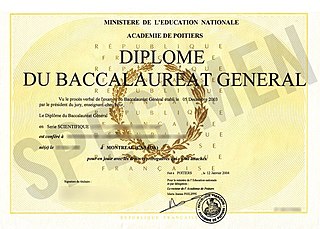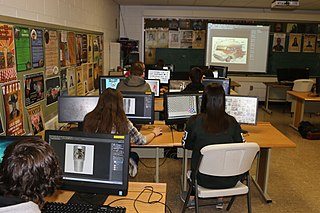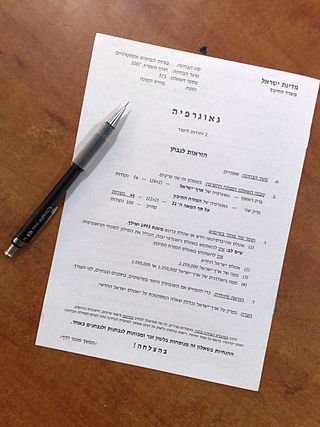Related Research Articles
Abitur, often shortened colloquially to Abi, is a qualification granted at the end of secondary education in Germany. It is conferred on students who pass their final exams at the end of ISCED 3, usually after twelve or thirteen years of schooling. In German, the term Abitur has roots in the archaic word Abiturium, which in turn was derived from the Latin abiturus.

Matura or its translated terms is a Latin name for the secondary school exit exam or "maturity diploma" in various European countries, including Albania, Austria, Bosnia and Herzegovina, Bulgaria, Croatia, Czechia, Hungary, Italy, Kosovo, Liechtenstein, Montenegro, North Macedonia, Poland, Serbia, Slovakia, Slovenia, Switzerland and Ukraine.

The baccalauréat, often known in France colloquially as the bac, is a French national academic qualification that students can obtain at the completion of their secondary education by meeting certain requirements. Though it has only existed in its present form as a school-leaving examination since Napoleon Bonaparte's implementation on March 17, 1808, its origins date back to the first medieval French universities. According to French law, the baccalaureate is the first academic degree, though it grants the completion of secondary education. Historically, the baccalaureate is administratively supervised by full professors at universities.

Matriculation is the formal process of entering a university, or of becoming eligible to enter by fulfilling certain academic requirements such as a matriculation examination.
A medical school is a tertiary educational institution, or part of such an institution, that teaches medicine, and awards a professional degree for physicians. Such medical degrees include the Bachelor of Medicine, Bachelor of Surgery, Master of Medicine, Doctor of Medicine (MD), or Doctor of Osteopathic Medicine (DO). Many medical schools offer additional degrees, such as a Doctor of Philosophy (PhD), master's degree (MSc) or other post-secondary education.
A cram school, informally called crammer and colloquially also referred to as test-prep or exam factory, is a specialized school that trains its students to achieve particular goals, most commonly to pass the entrance examinations of high schools or universities. The English name is derived from the slang term cramming, meaning to study hard or to study a large amount of material in a short period of time.
Education in Vietnam is a state-run system of public and private education run by the Ministry of Education and Training. It is divided into five levels: preschool, primary school, secondary school, high school, and higher education. Formal education consists of twelve years of basic education. Basic education consists of five years of primary education, four years of secondary education, and three years of high school education. The majority of basic education students are enrolled on a daily basis. The main goals are general knowledge improvement, human resources training and talent development.

Twelfth grade is the twelfth year of formal or compulsory education. It is typically the final year of secondary school in most of the world. Students in twelfth grade are usually 17-18 years old. Some countries have a thirteenth grade, while other countries do not have a 12th grade/year at all.
University admission or college admission is the process through which students enter tertiary education at universities and colleges. Systems vary widely from country to country, and sometimes from institution to institution.

The National College Entrance Examination (NCEE), commonly known as the gaokao, is a standardized college entrance exam held annually in Mainland China. It is required for entrance into all higher education institutions at the undergraduate level in the country. It is usually taken by students in their third and last year of senior high school.

Te'udat Bagrut is a certificate that attests that a student has successfully passed Israel's high school matriculation examination. Bagrut is a prerequisite for higher education in Israel.
Education in Jamaica is primarily modeled on the British education system.
In South Africa, matriculation is the final year of high school and the qualification received on graduating from high school, and the minimum university entrance requirements. The first formal examination was conducted in South Africa under the University of the Cape of Good Hope in 1858. In general usage, the school-leaving exams, which are government-administered, are known as the "matric exams"; by extension, students in the final year of high school are known as "matriculants" or, more commonly, "matrics". Once the Matric year has been passed, students are said to have "matriculated". See List of secondary education systems by country § South Africa.
The Sri Lankan Advanced Level (A-level), is a General Certificate of Education (GCE) qualification exam in Sri Lanka, similar to the British Advanced Level, conducted annually by the Department of Examinations of the Ministry of Education. It is usually taken by students during the optional final two years of collegiate level (grade 12 and 13 or external candidates, after they have completed GCE Ordinary Level exams. The majority of candidates enter the exams via their respective schools, while candidates who have finished school education can also apply as private applicants. The qualification also serves as an entrance requirement for Sri Lankan state universities. The exams are held in three mediums: Sinhala, Tamil and English.

The ICFESexamination, or Saber 11, is a high school exit examination administered annually in grade 11 in Colombian high schools. The exam is standardized, similar to the SAT and ACT examinations taken by high school students in the United States. The purpose of the exam is to evaluate students' aptitude in five subjects: critical reading, mathematics, social studies, science, and English. Each exam question has four multiple-choice answers, except for the English section which provides between three and eight possible answers for each question.

An examination or test is an educational assessment intended to measure a test-taker's knowledge, skill, aptitude, physical fitness, or classification in many other topics. A test may be administered verbally, on paper, on a computer, or in a predetermined area that requires a test taker to demonstrate or perform a set of skills.
Junior Cycle is the first stage of the education programme for post-primary education within the Republic of Ireland. It is overseen by the State Examinations Commission of the Department of Education, the State Examinations Commission and the National Council for Curriculum and Assessment (NCCA).
Advanced Placement (AP) International English Language is an AP Examinations course managed by Educational Testing Service (ETS) with the sponsorship of the College Board in New York. It is designed for non-native speakers to prepare for studying in an English-speaking university, particularly in North America. The course also gives students a chance to earn college credit. The three-hour exam assesses four language skills: listening, reading, writing, and speaking. The test paper has two sections: multiple-choice questions and free-response questions. APIEL committee consists of high school and university English teachers from Belgium, China, France, Germany, Switzerland, and the United States.
In Nigeria, the academic grading system scales from A to F (fail). Below is the grading system of Nigerian schools.
References
!